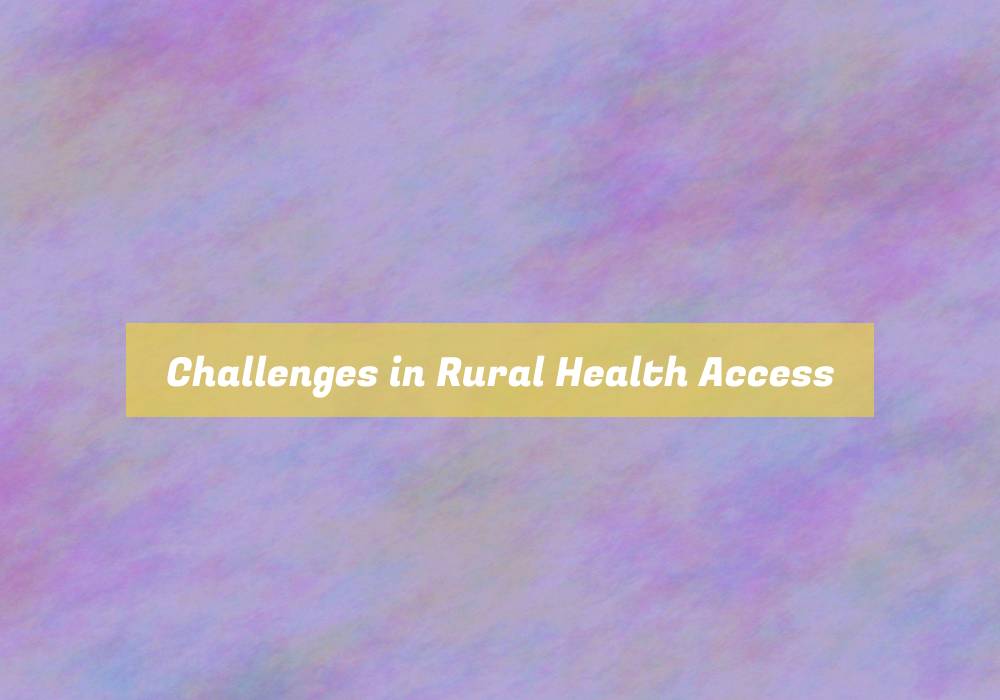Challenges in Rural Health Access
Are you aware of the unique challenges faced by rural communities when it comes to accessing healthcare?
Limited healthcare facilities and professionals, long travel distances, and financial barriers are just a few of the obstacles that impact the health outcomes of those living in rural areas.
These challenges not only affect the individuals seeking care, but also have broader implications for the overall health of these communities.
Understanding the complexities of rural health access is crucial for addressing the disparities in healthcare delivery.
Limited Healthcare Facilities and Professionals
If you live in a rural area, you may find that accessing healthcare facilities and professionals is often challenging due to limited availability. In many rural areas, there are fewer hospitals, clinics, and medical practices, making it harder to access essential healthcare services. This limited availability can result in longer travel times to reach the nearest healthcare facility, which can be particularly problematic in emergencies or for those with limited transportation options.
Furthermore, the shortage of healthcare professionals in rural areas can exacerbate the access challenges. There may be fewer doctors, specialists, nurses, and other healthcare providers available to serve the rural population. This can lead to longer wait times for appointments, reduced availability of specialized care, and a lack of continuity in primary care.
The limited presence of healthcare facilities and professionals in rural areas can also impact preventive care and health education initiatives. With fewer resources available, communities may struggle to provide adequate support for wellness programs, screenings, and health promotion efforts, ultimately affecting the overall health and well-being of residents.
Long Travel Distances
Accessing healthcare facilities and professionals may be challenging due to limited availability, and this can be further compounded by the long travel distances often required in rural areas. When you live in a rural area, getting to the nearest healthcare facility or professional may involve traveling long distances, sometimes even over rough terrain.
This can be especially difficult for individuals with limited access to transportation, such as the elderly or those with disabilities. Long travel distances not only consume time but also incur additional costs, including transportation expenses and potential loss of income due to time spent traveling.
Moreover, these distances can lead to delays in seeking necessary medical care, potentially exacerbating health conditions that could have been managed more effectively if healthcare services were more readily accessible.
The impact of long travel distances on healthcare access is a significant concern that requires innovative solutions, such as telemedicine and mobile healthcare clinics, to bridge the gap and ensure that rural residents can access the care they need without enduring extensive travel burdens.
Financial Barriers
Financial barriers can significantly impede access to healthcare services in rural areas. For many individuals and families living in rural communities, the cost of healthcare can be a major deterrent, preventing them from seeking essential medical care. Limited financial resources often force people to make difficult choices between paying for healthcare services and meeting other basic needs, such as food, housing, and transportation. High deductibles, copayments, and out-of-pocket expenses can pose significant challenges, particularly for those with chronic conditions requiring ongoing treatment. Additionally, the lack of comprehensive insurance coverage in rural areas can leave individuals vulnerable to exorbitant medical bills, leading to financial strain and potential debt.
Moreover, the scarcity of healthcare facilities in rural areas can contribute to increased healthcare costs. In many instances, rural residents may need to travel long distances to access specialized care or even basic medical services, incurring additional expenses for transportation and lodging. These financial barriers not only limit individualsG?? ability to seek timely medical attention but also exacerbate existing health disparities in rural communities.
Finding sustainable solutions to address these financial obstacles is crucial for improving healthcare access and overall well-being in rural areas.
Impact on Health Outcomes
How does the presence of financial barriers impact the overall health outcomes for individuals living in rural areas?
The impact of financial barriers on health outcomes in rural areas is substantial. Limited financial resources often lead to delayed or forgone medical care, resulting in poorer health outcomes. Without access to affordable healthcare services, individuals in rural areas may not receive timely preventive care or management for chronic conditions, leading to more severe health issues in the long term.
Financial barriers also affect the ability to afford medications and follow prescribed treatment plans, further exacerbating health disparities. Additionally, the lack of financial resources can hinder access to specialized care and mental health services, impacting overall well-being. The financial strain of healthcare costs may also lead to increased stress and anxiety, which can negatively impact mental and physical health.
In essence, the presence of financial barriers in rural areas significantly hampers individualsG?? ability to maintain good health and manage existing health conditions effectively. Addressing these barriers is crucial to improving health outcomes and narrowing the rural-urban health gap.
Conclusion
In conclusion, rural health access poses significant challenges due to limited healthcare facilities and professionals, long travel distances, and financial barriers.
These factors have a direct impact on health outcomes for individuals living in rural areas.
ItG??s important for policymakers and healthcare providers to address these challenges in order to ensure that all individuals, regardless of their location, have access to quality healthcare services.







You raise such important points about the healthcare challenges faced by rural communities, and I appreciate how you shed light on these often-overlooked issues. As someone who has spent time in rural areas, I’ve seen firsthand how the lack of nearby healthcare facilities can drastically affect the well-being of residents. For instance, a family member of mine who lives in a remote area had to drive over an hour to receive even routine care, which not only consumed valuable time but also placed a considerable financial strain on them due to transportation costs and lost wages.